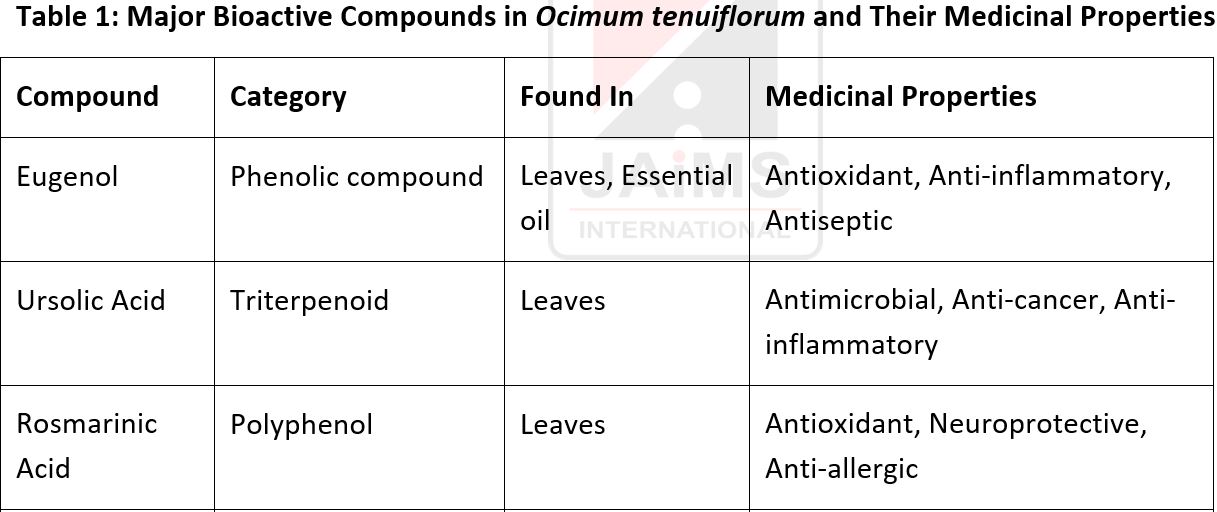A Comprehensive Review on Ocimum tenuiflorum
DOI:
https://doi.org/10.21760/jaims.10.7.29Keywords:
Ocimum tenuiflorum, Tulsi, Medicinal plants, Phytochemical compounds, Ayurvedic pharmacology, Bioactive compounds, Herbal medicineAbstract
Ocimum tenuiflorum is also known as Tulsi, Ocimum tenuiflorum is one of the revered medicinal plants in Indian medicine. Its ethnobotanical undertones together with its wide range of pharmacological abilities and significant cultural value make Tulsi immensely popular. This review analyzes Tulsi and explores its medicinal aspects considering the healing activities of antioxidants, anti-inflammatories, antimicrobial agents, and stress relieving agents. The paper searches its rich phytochemical properties identifying bioactive compounds such as eugenol, ursolic acid, and flavonoids, and analyzing their implication in health and disease. Its influence goes beyond health as the paper highlights environmental aspects of Tulsi, specifically air purification and pest repellents, demonstrating Tulsi’s adaptability to various agricultural conditions. Finally, the paper addresses the perennial relevance of Tulsi in the cultural, spiritual, and alternative medicine world. Combining scientific literature and ethnobotanical resources, this effort seeks to document the relevance of O. tenuiflorum to modern pharmacology and sustainable agriculture while appreciating its cultural history.
Downloads
References
Agrawal P, Rai V, Singh RB. Randomized placebo-controlled, single blind trial of holy basil leaves in patients with noninsulin-dependent diabetes mellitus. Int J Clin Pharmacol Ther. 1996;34(9):406–9.
Bhattacharyya D, Sur TK, Jana U, Debnath PK, Paul S. Clinical evaluation of anxiolytic activity of Ocimum sanctum Linn. Indian J Pharmacol. 2008;40(6):251–6.
Chattopadhyay RR. Possible mechanism of hepatoprotective activity of Azadirachta indica leaf extract: Part II. Indian J Pharmacol. 2003;35:97–9.
Gholap S, Kar A. Effects of Ocimum sanctum on lipid metabolism in hypocholesterolemic rats. J Med Food. 2004;7(3):345–9.
Manikandan P, Letchoumy PV, Gopalakrishnan M, Nagini S. Evaluation of Ocimum sanctum Linn. leaf extract on benzo[a]pyrene-induced lung carcinogenesis in mice. J Med Plants Res. 2007;1(1):22–9.
Mediratta PK, Sharma KK, Singh S. Evaluation of immunomodulatory potential of Ocimum sanctum seed oil and its possible mechanism of action. J Ethnopharmacol. 2002;80(1):15–20.
Prakash P, Gupta N. Therapeutic uses of Ocimum sanctum Linn (Tulsi) with a note on eugenol and its pharmacological actions: A short review. Indian J Physiol Pharmacol. 2005;49(2):125–31.
Rai V, Iyer U, Mani UV. Effect of Tulsi (Ocimum sanctum) leaf powder supplementation on blood sugar levels, serum lipids and tissue lipids in diabetic rats. Plant Foods Hum Nutr. 1997;50(1):9–16.
Singh S, Majumdar DK. Evaluation of anti-inflammatory activity of fatty acids of Ocimum sanctum fixed oil. Indian J Exp Biol. 1995;33(4):244–8.
Suanarunsawat T, Devakul NA, Ayutthaya WDN, Thirawarapan SS. Anti-lipid peroxidative and antioxidant effects of aqueous extracts from Ocimum sanctum Linn. leaves in rats. J Ethnopharmacol. 2006;104(3):425–32.
Vasudevan R, Parle M, Singh N. Memory-enhancing activity of Ocimum sanctum in rats. Phytother Res. 1997;21(5):409–15.















